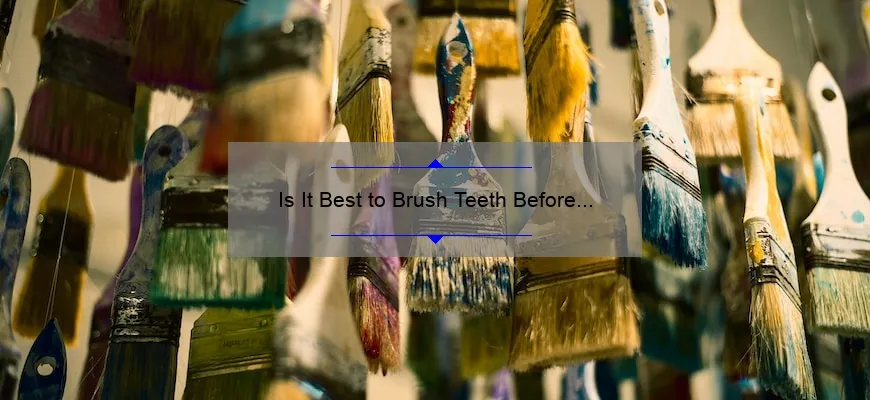Short answer: Is it best to brush teeth before breakfast:
According to dental experts, it is generally recommended to wait 30 minutes after consuming acidic foods or beverages (such as orange juice) before brushing your teeth. However, if you don’t consume such items at breakfast, brushing your teeth beforehand can help remove overnight bacteria build-up and maintain oral hygiene throughout the day. Ultimately, personal preference and habits should also be considered when deciding whether to brush before or after eating in the morning.
What are the benefits of brushing teeth before breakfast?
What are the benefits of brushing teeth before breakfast?
Brushing teeth is an essential part of our daily routine, but have you ever considered doing it before having your morning meal? It turns out that brushing your teeth first thing in the morning can actually provide numerous benefits for both your oral health and overall well-being.
Here are a few key reasons why you should consider making this simple change to your dental hygiene routine:
1. Removes overnight plaque build-up: Brushing immediately after waking up helps eliminate bacteria and plaque that accumulated on your teeth during sleep.
2. Fresher breath: Starting off with a fresh mouth not only makes interacting with others more pleasant but also sets a positive tone for the day ahead.
3. Protects tooth enamel: When we consume acidic foods or drinks (e.g., coffee) without prior brushing, they can weaken tooth enamel over time. Brushing beforehand creates a protective barrier against these harmful substances, preserving our pearly whites’ strength and integrity.
By embracing this practice, you’ll experience some noticeable improvements in various aspects related to dental health:
4. Decreases risk of gum disease: Removing plaque from around gums reduces inflammation and lowers chances of developing gingivitis or periodontal disease.
5.Reinforces good habits:Prioritizing oral care at the start of each day forms healthy dental hygiene behaviors which will likely extend into other areas such as flossing regularly or using mouthwash.
6.Improves nutrient absorption:When consuming food shortly after cleaning their mouths people find tastes better,as they prevent flavors being distorted by lingering bad taste.
In conclusion, choosing to brush one’s teeth before eating breakfast offers several advantages including fresher breath,
stronger enamel protection、and decreased risks associated with gum diseases.
Taking just two minutes every morning can make all
the difference when it comes to maintaining optimal oral
health throughout life!
– Enquire about the advantages and reasons why it is recommended to brush your teeth first thing in the morning, prior to eating or drinking anything.
Have you ever wondered why it is recommended to brush your teeth first thing in the morning, before eating or drinking anything? Well, there are several advantages and reasons behind this advice. Let’s explore them!
1. Removes morning breath: Brushing your teeth eliminates the stale smell that lingers in your mouth after sleeping. It helps freshen up your breath and prepares you for the day ahead.
2. Prevents tooth decay: Overnight, bacteria multiply inside our mouths due to food particles left from dinner or snacks consumed before bedtime. By brushing right away in the morning, we remove these bacteria and decrease their ability to cause tooth decay.
3. Maintains oral hygiene: Brushing in the morning removes plaque buildup on our teeth that has accumulated overnight while we sleep. Plaque contains harmful acids produced by bacteria which can lead to cavities if not removed regularly.
4.Cleanses taste buds: As we brush our teeth with a flavored toothpaste early in the morning (especially ones containing mint), it stimulates our taste buds as they interact with those flavors during brushing – an added benefit of starting off each day with clean pearly whites!
Brushing your teeth first thing every day has numerous benefits including fighting bad breath , preventing dental issues such as cavities maintaining overall good oral health
Does brushing after breakfast have any negative effects on dental health?
Does brushing after breakfast have any negative effects on dental health?
Brushing our teeth is a daily habit that we’ve been taught since childhood. Most of us follow the routine of brushing first thing in the morning, before or after having breakfast. However, there has been some debate regarding whether it’s better to brush before or after this crucial meal. Let’s explore if brushing after breakfast could potentially harm our dental health.
1. Increased acid erosion: Consuming acidic foods and beverages like citrus fruits and juices can weaken tooth enamel temporarily due to their high acid content. Brushing right away can lead to further abrasion and damage the weakened enamel.
2. Food particles left behind: When we eat, food particles often get trapped between our teeth and along gum lines – prime spots for bacteria growth that may result in plaque formation over time.
3.Tooth staining potential: Certain colored drinks like coffee or tea contain chromogens which are pigments that attach themselves easily onto tooth surfaces leading to unsightly stains; by waiting about 30 minutes post-mealtime removes remnant acids present thereby reducing surface affinity for such color attachment possibilities
Brushing your teeth immediately following a meal without these protective measures means you’re at risk for losing more than just those extra pounds- You might also be harming yourself dentally as well! So why take chances with something so vital? Just wait until your body finishes breaking down everything eaten earlier then go ahead & clean out mouth properly instead!
In conclusion, while it may seem logical to brush directly after eating breakfast – especially when aiming for fresh breath throughout day long work schedules ahead-, doing so isn’t always ideal from standpoint preserving overall oral hygiene levels too The best approach would entail thoroughly rinses-between cleansing routines within an appropriate timeframe where necessary ingredients got sufficient contact ensuring least likelihood detrimental outcomes anytime soon Overall aim should remain achieving optimal oral care rather than merely emphasizing one aspect solely upon appearance alone
– Explore potential drawbacks or risks associated with delaying toothbrushing until after having breakfast and discover if there are any adverse consequences for oral hygiene.
Are you someone who enjoys a delicious breakfast before brushing your teeth? While it may seem convenient, there can be potential drawbacks and risks associated with delaying toothbrushing until after having breakfast. Let’s explore if there are any adverse consequences for oral hygiene.
1. Tooth decay: Consuming sugary or acidic foods at breakfast can lead to cavity formation as these substances interact with the bacteria in our mouths. By delaying toothbrushing, we give these harmful ingredients more time to wreak havoc on our dental health.
2. Stained teeth: Certain foods like coffee, tea, and berries have staining properties that can leave lasting marks on our enamel when left unattended for an extended period of time.
3. Bad breath: Breakfast favorites such as garlic-laden dishes or strong-smelling beverages contribute to bad breath by allowing odor-causing particles to linger in the mouth throughout the morning.
Even though consuming food before brushing might pose some challenges for your oral hygiene routine, being mindful of these risks allows us to take preventive measures:
– Rinse thoroughly: After eating breakfast, rinse your mouth with water or an alcohol-free mouthwash to remove any remnants from your meal.
– Limit sugar intake: Choose low-sugar options during breakfast and opt for healthier alternatives whenever possible.
– Chew sugarless gum: Chewing gum stimulates saliva production which helps wash away debris while neutralizing acids in the mouth.
In conclusion, delaying toothbrushes till post-breakfast poses certain drawbacks including increased risk of cavities/stains/bad breath due to prolonged exposure; however taking preventative actions such as thorough rinses/limitation/chewing gum minimizes harm & supports good oral hygiene practices






